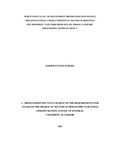| dc.description.abstract | The broad objective of this study was to establish the influence of perceived value of
investment promotion incentives, organizational characteristics and macro-marketing
environment on performance of firms in the export processing zones (EPZ) in Kenya.
The study had six specific objectives to determine both direct and indirect
relationships among variables. A conceptual model was developed, and from it, six
hypotheses were formulated. The study was cross-sectional survey where all operating
EPZ firms in Kenya formed the population. Secondary data were obtained from
various reports and bulletins. Primary data were collected from the study population
using structured self-administered questionnaire. The unit of measurement of the study
was the firm. Reliability test was undertaken using dimension reduction with
Cronbach’s alpha of 0.60 as the cut-off point. Pre-testing (pilot) exercise was carried
out to determine content validity, and necessary corrections and adjustments made to
the instrument. Analysis of data was done using various measures and tests through
descriptive and inferential statistics. Simple and multiple linear regression, and
correlation analyses were used to test the six hypotheses. The relationships between
and the influence of the variables were determined, inferences made and conclusions
drawn. Results indicated that perceived value of investment promotion incentives had
significant influence on firm performance. The tests also established that there was
strong positive relationship between organizational characteristics and firm
performance. Equally strong positive relationship was observed between macromarketing
environment and firm performance. Macro-marketing environment was
found to have significant moderating influence between perceived value of investment
promotion incentives and firm performance. It was further established that
organizational characteristics had significant moderating influence on the relationship
between perceived value of investment promotion incentives and firm performance.
Finally, the study revealed that perceived value of investment promotion incentives,
organizational characteristics and macro-marketing environment had significant joint
influence on firm performance. However, the contribution of macro-marketing
environment to the joint effect was negligible. The study has contributed to theory
development, policy and marketing practice to the extent that it made
recommendations and offered suggestions on areas of future research. The study had
some limitations mainly caused by the scope of work. Only top management was
targeted leaving out other employees. Sampling across the organizational hierarchy
could ensure a larger and more inclusive sample. Furthermore, as a study variable,
organizational characteristics was constructed with limited aspects of culture, structure
and design namely age, size and ownership. However, the limitation did not have an
adverse effect on the results. Future studies could address these limitations by
adaptation to the sampling and instrument designs, which may include longitudinal
studies. | en_US |

